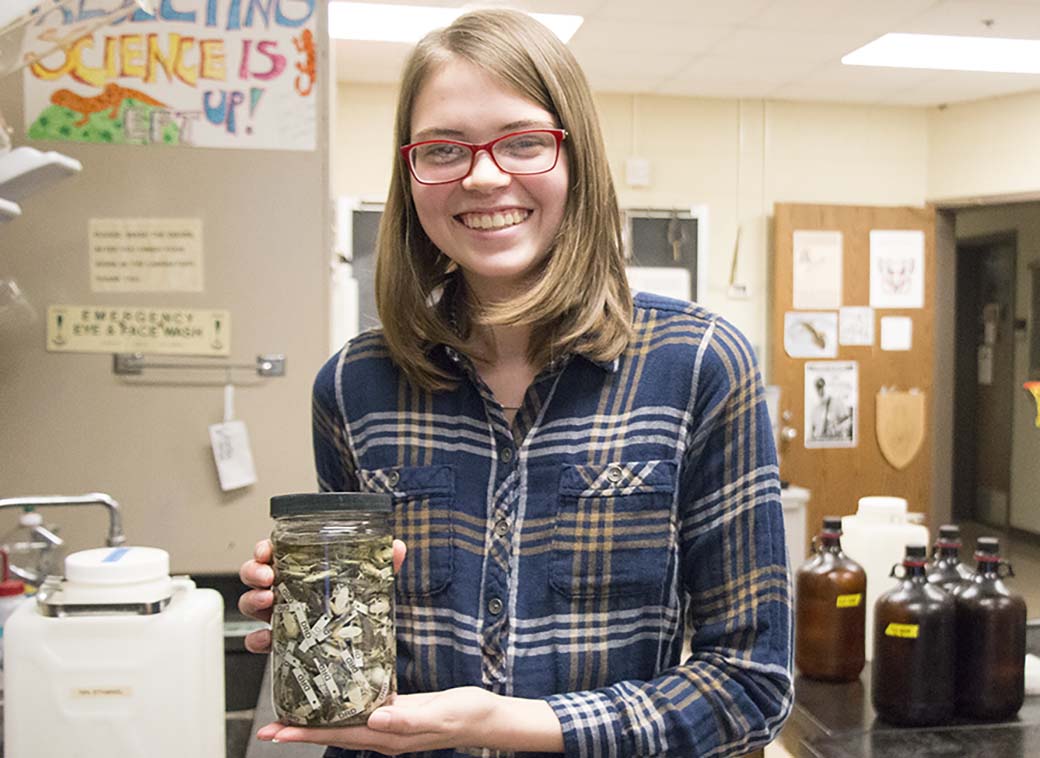
Biology students conduct research on frogs, turtles
USD biology students are getting a firsthand experience in labs.
Jake Kerby, associate professor of biology, took students to Lake Oahe this summer to conduct research on turtles.
“I think USD is a great place to easily get involved in some really important research and take advantage of it, and I encourage students to do that,” Kerby said. “A lot of biology students can sit through classes, but a lot of the more successful ones are involved in research.”
Mapping out a passion
Anna Kase, a first-year graduate student, conducted research at the Lake Oahe turtle surveys. She’s working towards her Ph.D. in biological science.
Kase is studying how river systems and dams affect turtles, with an emphasis on observing false map turtles.
“Turtles are honestly my ideal species to work with,” Kase said. “When this opportunity presented itself – that there was funding for me to come and be on a research assistantship working with an animal that I care really passionately about – it was perfect.”
She meets with Kerby, her advisor, regularly to discuss her research and next steps. After graduation, Kase plans on teaching, but is open to different career paths.
“Ultimately I’d like to be a professor because I absolutely adore sharing information about biology and herpetology,” Kase said. “But I if I do some cool field work in between becoming a professor and earning my degree, I won’t complain, because I’d also like to be that crazy eccentric old lady that has just tons of stories.”
An early start
Many of the undergraduates that went on the trip started out in Kerby’s biology courses as first-years.
“They’ll start out doing some simple things in the lab, and then from there, move to different projects,” Kerby said. “Often the ones who stick around and do a lot of work, I recruit in the summer.”
Emme Schmidt, a sophomore medical biology major, was one student introduced to research through Kerby’s lab work.
Schmidt said she found her love of nature fit in well with the Lake Oahe surveys.
“I started volunteering, sorting out bug samples. (Kerby) liked the work I did, he thought I was dedicated, so he asked me to come work for him this summer,” Schmidt said. “That was the first time I’ve done fieldwork. We got to spend our days camping and out on a boat looking for turtles.”
Schmidt works in the ecology and microbiology labs at USD. She’s been studying frogs and the role of certain bacteria on their skin as part of her honors thesis.
“My project was genetically modifying a species of bacteria called Serratia marcescens. They’re naturally antifungal, so we knocked out a gene that we thought was responsible,” Schmidt said. “Then we introduced it to frogs and exposed them to a fungal pathogen. We’ll be analyzing data to compile results and write an article to hopefully get published this spring.”
Although there are sizable differences between frogs and humans, Schmidt said she sees a relationship between her amphibian biology research and her career plans.
Schmidt plans to attend medical school and said she’s interested in doing a master’s and Ph.D. program.
“I get asked a lot, ‘You want to be a doctor, why are you doing research with frogs?’ And honestly, I’m still learning what people that are working in medical research labs are learning,” Schmidt said.
Kerby said he takes pride in helping his students find the right research environment to fit their needs, whether it involves amphibians or humans.
“It’s fun to watch their journeys,” Kerby said. “I’ll get a lot of freshmen, see they’re a good student, and then direct them to different labs based on their interests. Even the people who don’t go on to do research can read and understand research better.”

